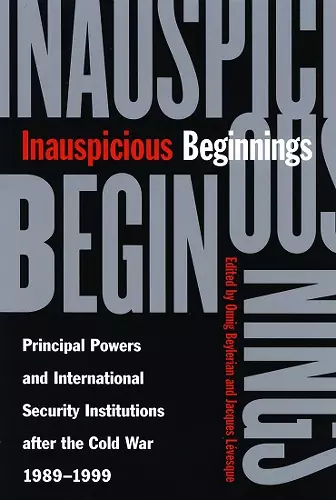Inauspicious Beginnings
Principal Powers and International Security Institutions after the Cold War, 1989-1999
Jacques Lévesque author Onnig Beylerian author
Format:Paperback
Publisher:McGill-Queen's University Press
Published:29th Mar '04
Currently unavailable, our supplier has not provided us a restock date

The book examines the post-Cold War world, emphasizing how the United States established overwhelming power, impacting international security and institutions.
In Inauspicious Beginnings, the authors explore the geopolitical landscape that emerged after the Cold War, highlighting the expectations of a new world order. Many international experts believed that institutions like the United Nations Security Council and NATO would play crucial roles in maintaining global peace and security. However, the reality of the 1990s revealed a different narrative, characterized by widespread insecurity and humanitarian crises. This period underscored the urgent need for a more effective system of security institutions, yet the leading powers failed to establish such frameworks.
Instead, the United States emerged as the dominant force in this new order, particularly under the administrations of George H.W. Bush and Bill Clinton. Rather than fostering a collaborative approach to international security, these administrations focused on building coalitions and catering to allies, often sidelining the need for a comprehensive security system. Meanwhile, other major powers were either distracted by internal issues or chose to defer to U.S. leadership, further consolidating American influence on the global stage.
As Inauspicious Beginnings illustrates, by September 11, 2001, the United Nations Security Council had become an outdated institution, ill-equipped to tackle the complex challenges it faced. The unilateral actions taken by the United States, particularly in Iraq, raised significant questions about the Council's relevance and effectiveness in the evolving international landscape.
"This book addresses an important theoretical and operational issue in contemporary international relations, namely, the role played by international security institutions in the foreign policy calculation of the major powers during the post-Cold-War era. It casts valuable light on the theoretical debate, pitting structural realists against institutionalists and constructivists. It is, to my knowledge, the only study focusing upon this particular set of actors and it is put together with the able contributions of an impressive set of country experts who are also conversant with the larger issues of IR." David Haglund, Sir Edward Peacock Professor of Political Studies, Queen's University
ISBN: 9780773526266
Dimensions: unknown
Weight: 480g
376 pages